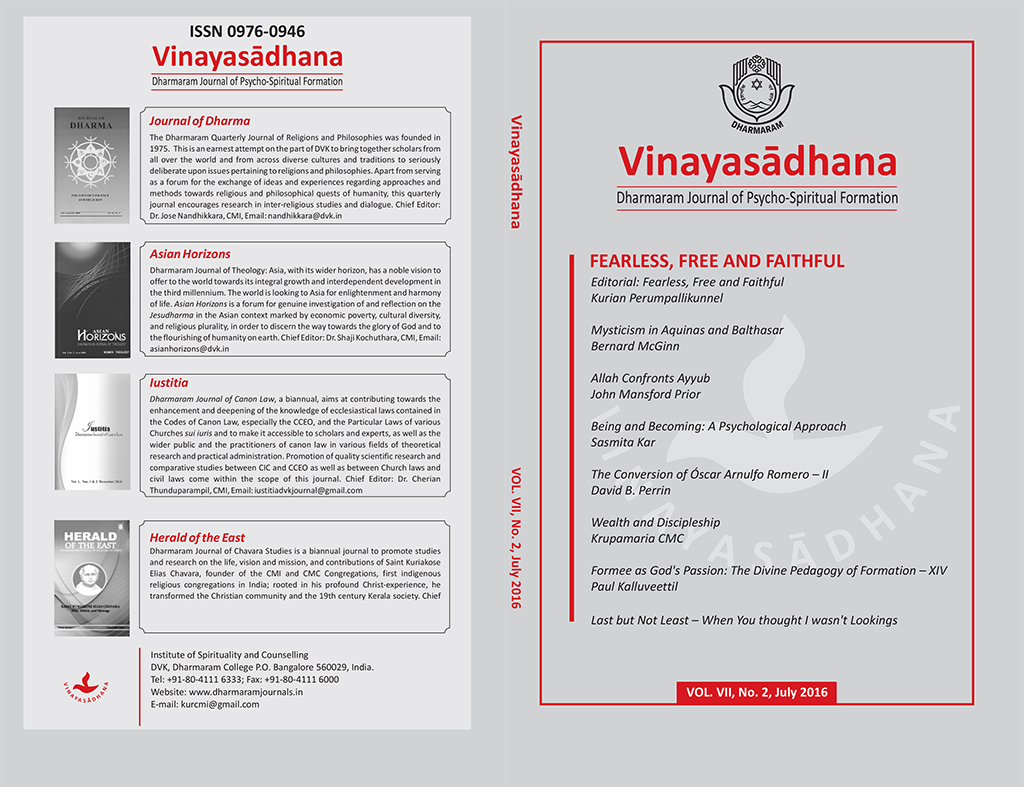The Clash of Transcendence and History
The Conversion of Óscar Arnulfo Romero (Part – II)
Keywords:
Transcendence and History, Óscar Arnulfo Romero, El SalvadorAbstract
Óscar Arnulfo Romero y Galdámez (1917–1980), a Salvadoran bishop, lived during a time of great political and civil turbulence. The local Roman Catholic Church did regrettably little to quell the suffering of its people. Romero, in the earliest part of his episcopacy, and like the bishops around him, fell into this kind of complacency. Yet all of this was to shift radically for Romero as a result of events in 1977, when he changed from an introverted conservative to an outspoken champion of his people. This article is a theological analysis, one of many possible analyses, of how such a change, such a conversion, can be framed within the tradition of Christian spirituality: in the clash of transcendence and history, that is, an understanding that God meets God’s people in the events of their lives – even in tragic events, as witnessed in the people of El Salvador – is conversion wrought. What is special about Romero’s conversion in the clash of transcendence and history, as suggested by this article, is its similarity to the lives of those whom the Church has come to know as mystics. Romero, in the end, gave his all to become the very face of God for his own people, for the people of Latin America, and now for the whole world. The sign of a mystic, martyr, and saint indeed.
References
Brockman, James R. (1982) The Word Remains: A Life of Óscar Romero, Maryknoll, NY: Orbis Books.
Brockman, James R. (1999) Romero: A Life, Maryknoll, NY: Orbis Books.
Brockman, James R. (ed and trans), (2004) Óscar Romero: The Violence of Love, Maryknoll, NY: Orbis Books.
Clarke, Kevin (2014) Óscar Romero: Love Must Win Out, Toronto: Novalis.
della Rocca, Morozzo (1980) Primero Dios, quoting De Grazia Gaspari in Il Manifesto cited in Margaret R. Pfeil, “Óscar Romero’s Theology of Transfiguration,” in Pelton, Archbishop Romero and Spiritual Leadership in the Modern World.
Dennis, Marie, Renny Golden, and Scott Wright (2000) Óscar Romero: Reflections on His Life and Writings, Maryknoll, NY: Orbis Books.
Downey, Michael (1994) “In the Ache of Absence,” Liturgical Ministry 3.
Francis, Pope (2015) Address via video message to the Second International Congress of Theology in Buenos Aires, Vatican City, September 4, (Vatican Information Services).
Francis, Pope (2015) Apostolic Letter of Beatification for Óscar Romero sent to the Archbishop of San Salvador, Msgr. José Luis Escobar Alas, May 23, 2015. Transcript by Vatican Radio: http://en.radiovaticana.va/news/2015/05/23/pope_francis_letter_for_the_beatification_of_%C3%B3scar_romero/1146203#. Accessed September 17, 2015.
Kavanagh, Kieran and Otilio Rodriguez (1991) The Collected Works of St. John of the Cross, with Introductions by K. Kavanagh, rev. ed., (Washington, DC: Institute of Carmelite Studies, [Kav]). References use the following format: F = The Living Flame of Love (second redaction), followed by the stanza number and paragraph number. For ease of reference, these will be included with the citation in the main body of the text.
Lonergan, Bernard (1972) Method in Theology, Toronto: University of Toronto Press.
Otto, Rudolf (1962) Mysticism East and West: A Comparative Analysis of the Nature of Mysticism,” Bertha L. Bracey and Richenda C. Payne, trans., 1932, New York: Macmillan.
Peace Agreement (1992) http://www.usip.org/publications/peace-agreementsel-salvador. Accessed September 17, 2015.
Pelton, Robert (2006) Romero: Martyr and Prophet for the New Millennium, Scranton, PA: University of Scranton Press.
Pelton, Robert S. (ed), (2015) Archbishop Romero and Spiritual Leadership in the Modern World, New York: Lexington Books.
Pelton, Robert S. (ed), (2015) Archbishop Romero and Spiritual Leadership in the Modern World, New York: Lexington Books.
Pelton, Robert S., Robert Ball and Kyle Markham (ed), (2004) Monsignor
Romero: A Bishop for the Third Millennium, Notre Dame, IN: University of Notre Dame Press.
Perrin, David B. (1996) “Mysticism and Art: The Importance of Affective Reception,” Église et Théologie 27/1
Perrin, David B. (1997) “Asceticism: The Enigma of Corporal Joy in Paul Ricoeur and John of the Cross,” Pastoral Sciences, 16:135–62.
Perrin, David B. (1997) For Love of the World: The Old and New Self of John of the Cross, International Scholars Publications [title now held by The Rowman & Littlefield Publishing Group]: San Francisco, CA.
Perrin, David B. (2007) “The Uneasy Relationship Between Christian Spirituality and the Human Sciences: Psychology as a Test Case,” Spiritus 7.2, 169–92.
Perrin, David B. (2014) “The New Self of John of the Cross,” Vol. V, No. 1 (January), Vinayasādhana: Dharmaram Journal of Psycho-Spiritual Formation, Dharmaram College, Bangalore, India, 31–42.
Romero, Óscar (1977) “The Church, The Body of Christ in History,” Second Pastoral Letter, http://www.romerotrust.org.uk/documents/pastoral%20letter/second%20pastoral%20letter.pdf. Accessed September 17, 2015.
Sheldrake, Philip (1992) Spirituality and History, New York: Crossroad.
Sobrino, Jon (1990) Archbishop Romero: Memories and Reflections, Maryknoll, NY: Orbis Books.
Soelle, Dorothee (2001) The Silent Cry: Mysticism and Resistance, Minneapolis: Fortress Press.
United Nations website: http://www.csusmhistory.org/atkin008/plea-to-carterresponse-from-reagan. Accessed September 13, 2015.
Wadell, Paul J. (2008) The Primacy of Love: An Introduction to the Ethics of Thomas Aquinas, Eugene, OR: Wipf and Stock.
Zynda, Damian “Archbishop Óscar Romero: A Life Witness to the Glory of God,” in Pelton, Archbishop Romero and Spiritual Leadership in the Modern World.


